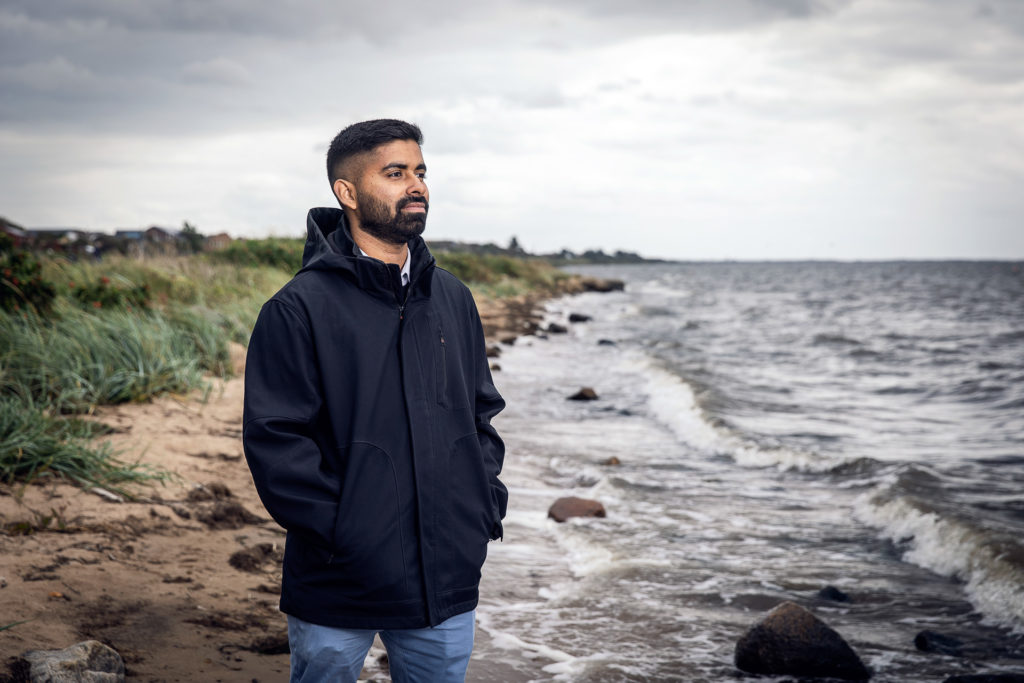Academia meets industry… and vice versa. Denmark holds a strong position in the delicate art of making theory and practice blend blood. Ultimately benefitting both academic societies and private companies as well as the world outside.
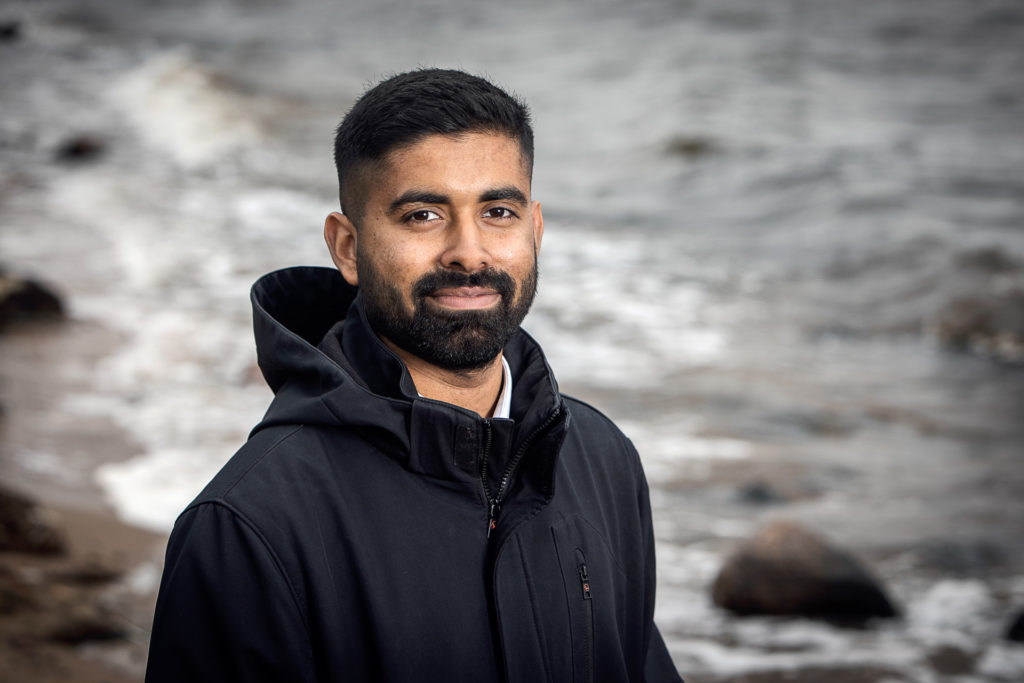
Photo: Anders Trærup, freelance photographer
”I was born and raised not far from New Delhi… a giant metropolis with 22 million people. I also lived in New York with a population of 8 million. Even Southampton – hometown of my university – has 250,000 inhabitants. Now I live in Ringkøbing together with 10,000 people or so. It’s quiet but I actually find the rather sleepy atmosphere charming. I believe it’s an ideal place for me to write the initial part of my PhD thesis”.
Kevin Jose (25) came directly from India to Denmark in January 2020. He arrived in the midst of the month-long Nordic winter darkness challenging even to many native Danes suffering from a weather-burdened mood. On top of only a few hours of daylight this particular winter was distinct with a record number of rainy and windy days.
“The subtropical summer we experience now, however, definitely warmed me up. Actually, I find the indoor temperatures a bit challenging these days. Unlike India there is no air conditioning inside our office building and the campus where I live. The bright summer nights with very early sunrise is also something for me to get used to”.
Significant new knowledge
The fellow European Industrial PhD project between the University of Southampton and Vestas aircoil involves four young talents from abroad. The project is funded by the EU Horizon program. The project is planned to last four years with a 50/50 split between studies in the UK and Denmark. The PhD’s have weekly online meetings with their university supervisor and biweekly meetings with their industrial supervisor. At Vestas aircoil the industrial supervisor is Claus H. Ibsen, Master of Science in Engineering (M. Sc. Eng.) and PhD himself.
A PhD (Doctor of Philosophy) is a 3-year postgraduate doctoral degree, awarded to students who complete an original thesis offering a significant new contribution to knowledge in their subject. PhD qualifications are available in all subjects and usually the highest level of academic degree a person can achieve.
Structures in nature
Working closely together with PhD-colleague Milena Watanabe Bavaresco from Brazil, Kevin is part of the research and development team at Vestas aircoil. The market leading Danish manufacturer of marine and industrial cooling systems joined forces, three years ago, with University of Southampton in preparations for a fellow European Industrial PhD project, financially supported by the EU Horizon program that Kevin is now part of.
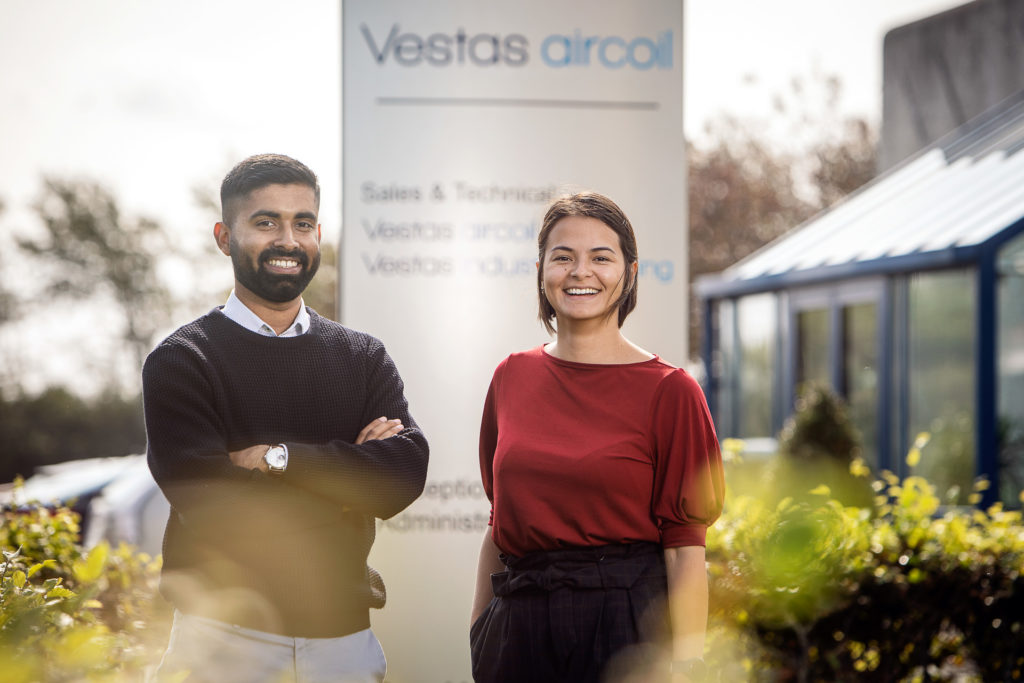
The international collaboration including UK, Denmark, the European Union and talented young people from abroad carries the ambition to spark even closer cooperation between academia and industry for their mutual benefit.
“And that is indeed what we achieve by spending time at Vestas aircoil. Once your fundamental knowledge is in place you start to see the structures we examine everywhere. Even in nature and the landscape surrounding us”.
Supporting 65,000 researchers
With the Marie Skłodowska-Curie actions (MSCA) the EU Commission is supporting the career development and training of researchers. The MSCA are expected to finance around 65,000 researchers, including 25,000 doctoral candidates. The EU target is to spend 3% of EU GDP on research and development by 2020. At the MSCA start in 2014 at least 1 million new R&D jobs had to be established.
By funding excellent research and offering attractive working conditions, the MSCA offer high quality professional opportunities open to researchers of any age, nationality or discipline.
The specific objectives of the Marie Skłodowska-Curie Innovative Training Networks (ITN) are:
1. to train a new generation of creative, entrepreneurial and innovative early-stage researchers able to face current and future challenges and to convert knowledge and ideas into products and services for economic and social benefit
2. to raise excellence and structure research and doctoral training, extending the traditional academic research training setting, incorporating the elements of Open Science and equipping researchers with the right combination of research-related and transferable competences
3. to provide enhanced career perspectives in both the academic and non-academic sectors through international, interdisciplinary and intersectoral mobility combined with an innovation-oriented mind-set.
The beauty of our work
“To give you an example, one day I was at the fjord watching the waves coming in. What I observed and realized was how plants along the shore influence the rhythm of the water surface. In fact, plantation at the fjord has an effect on the waves that in some ways is similar to the effect that tubes and fins in a Vestas aircoil charge air cooler have on vibrations of the cooler. I find it rather fascinating to recognize and retrieve the dynamics from completely different spheres and potentially make them relevant even to an industrial cooling system. That is the beauty of our work”.
For Kevin the inspiration goes far beyond observing waves at Ringkøbing Fjord. Even his knowledge of vibrations from musical drums and trees reactions to earthquakes carry insights that Kevin can take advantage of on a daily basis.
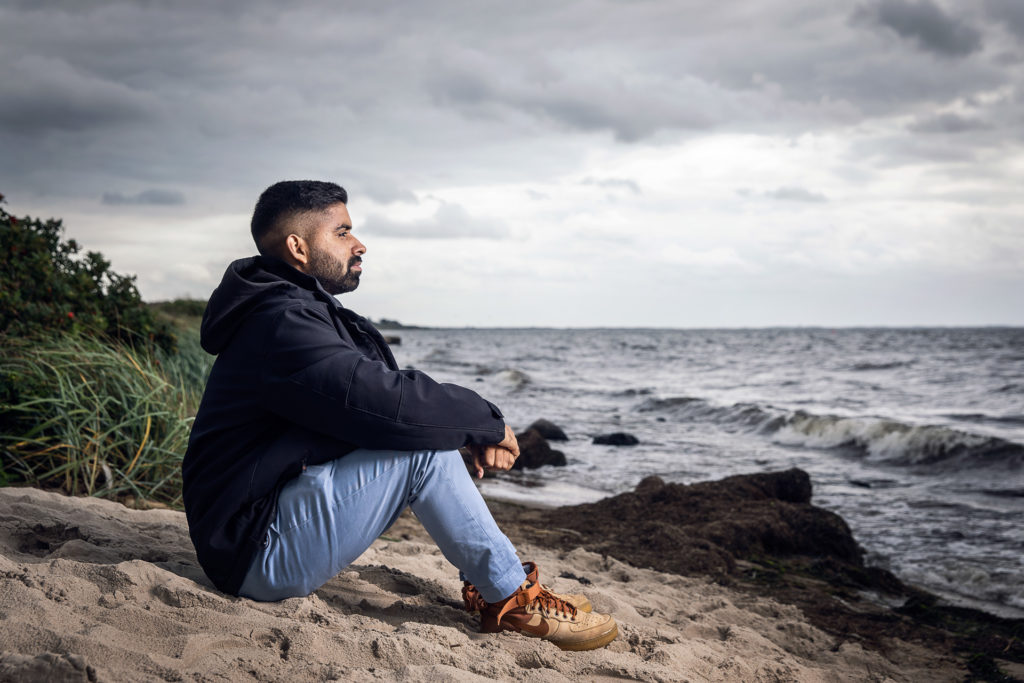
Troubles to shoot
Sitting at his desk in the Research and Development Department at the Vestas aircoil headquarter in Denmark Kevin is working on computer models that are capable of translating the physical dynamics that he observes elsewhere into tools that have the capacity to make sophisticated know how workable in an industrial setting as well.
Pioneers for six decades
Founded in the 1950s Vestas aircoil has been a market leading manufacturer of marine and industrial cooling products ever since. Vestas built the first marine diesel engine charge air cooler in the world for Burmeister & Wain in 1956. The company is headquartered in Lem, a small industrial town often associated with its blacksmith industry.
Until the 1980s Vestas aircoil was part of Vestas Wind Systems also located in Lem. Today, Vestas aircoil is owned by Genua. Vestas aircoil has 250 employees based in Denmark, Southern Europe and the Far East.
www.vestas-aircoil.com
One highly relevant topic at his current employer is the effect of manufacturing tolerance on vibrations.
“Vibrations cause deformations in materials and structures that – if not predicted accurately in calculations and design – potentially may cause failure. From let’s say aircraft jet engines we know that even the slightest deviations in geometric or material parameters in one fan blade eventually may break down the entire engine with catastrophic consequences to follow. 1 or 2 percent dissimilarity can easily evolve into a 100 percent disaster. Inspired by real life industrial challenges, my work focuses on building the simplest possible models that translate issues related to vibrations into academic concepts and responses from physics that are durable at the engineer’s desk as well as in the production facility”.
Ultimately, Kevin’s ambition is to succeed with scientific simplification models that may not run three decimals on expensive super computers but strike an accuracy that make the models useful in contexts where thousandths are overkill.
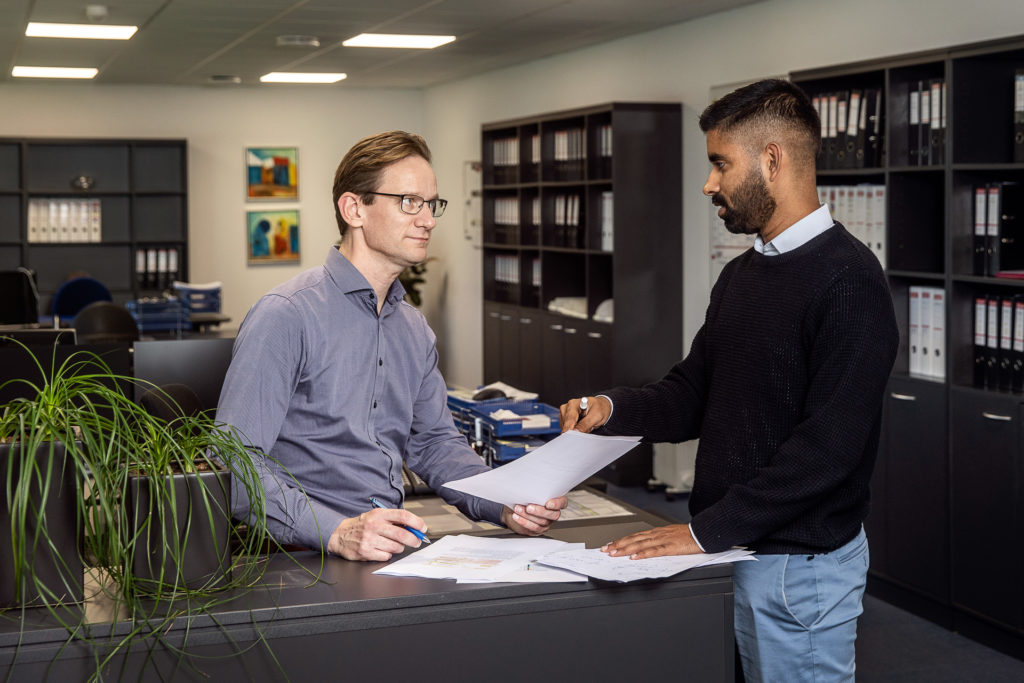
The nature of the PhD
Kevin is currently researching and writing a PhD thesis he plans to submit in 2 years or so. Meanwhile he will write numerous scientific articles submitted to relevant journals with the PhD constituting a summary of the original work presented and connected over the course of the PhD project.
”A PhD thesis would normally be 100-150 pages and must present what is acknowledged by independent researchers as new scientific realizations. If successful a PhD would ideally become one in only 2-3 experts worldwide in his or her particular field of super specialized science”.
To focus one must, however, relax now and then. In Kevin’s case he prefers to rest his curious scientific mind while searching through a camera lens for picturesque landscapes, sunsets or lighthouses along the North Sea coastline and Ringkøbing Fjord. Or enjoy the social life at the campus in Ringkøbing with those 30 other young international talents living there… many of them young researchers at the wind turbine giant Vestas Wind Systems located next door to Vestas aircoil.
Now and then, Kevin also put aside the scientific literature and allow himself to linger with books describing recent Danish history.
“I am rather stunned by the homogeneity of the Danish society. Once in a while, though, I miss the dynamic cultural dissimilarity I grew up with in India. I speak two Indian languages fluently and my parents are part of a religious minority comprising only two percent of the population in India. I find it exciting when cultures and contradictions meet, but I am deeply impressed by the non-hierarchical society in Denmark. We sit in the CEOs office to do this interview for instance… that pretty much explains the Danish informality”.
Magic in the campus kitchen
Most of all, Kevin misses the spicy Indian cuisine he was born and raised with. After months of searching and assisted by friends in Denmark and abroad, a decent spice rack with ginger, turmeric, cumin, cilantro and fenugreek is slowly materializing in his campus kitchen. As well as new discoveries in kitchen machinery.
“We do not use electrical ovens in India. It was a somewhat magical discovery to me, and I decided to bake bread only to suffer the painful response that fellow students in the campus kitchen complimented me for my “fine cake”. After that I started looking for bakeries with bread on sale”.
It may well be that his core competences lay outside baking, however, true talent does not deny itself. Looking into the future Kevin see himself almost anywhere in the world his expertise may unfold:
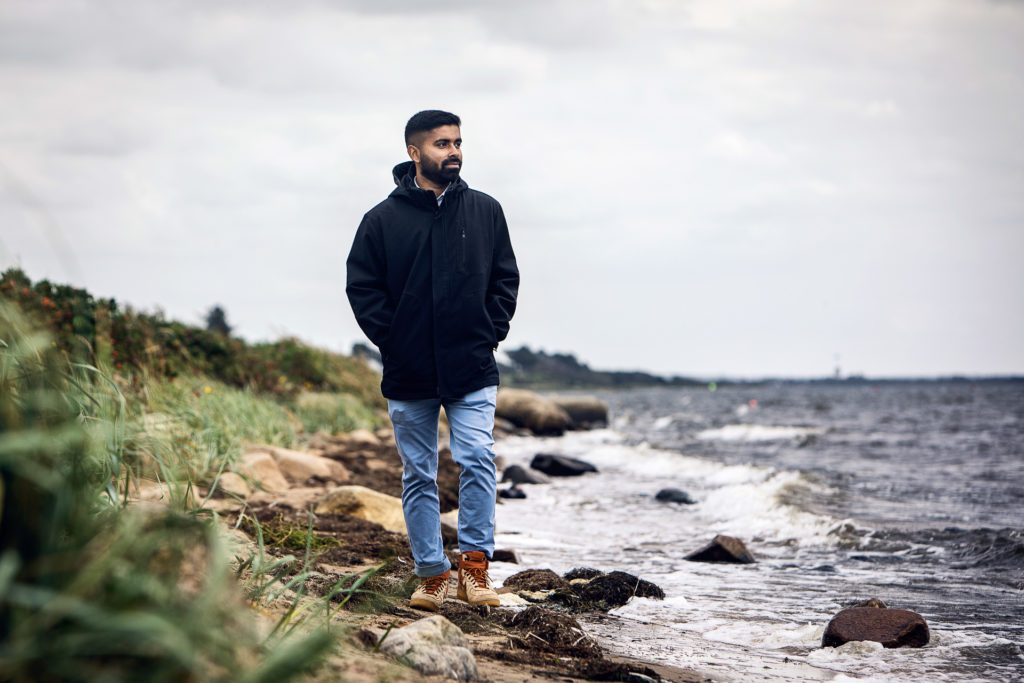
“If my future career will lead me to a university position as professor or a cutting-edge research and development position in the private sector I really don’t know. It is still in the making, I guess. In fact, I don’t have strong feelings what part of the world will become my future home. I am very flexible and mostly driven by job opportunities that have the potential to unleash the science I feel passionate about”.
Milena: “I fell in love with research”
Atul: “Finding trade-offs is my trade”
Talha: “Failure is what I predict”


